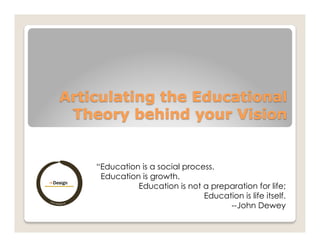
Why do we teach?
- 1. “Education is a social process. Education is growth. Education is not a preparation for life; Education is life itself. 2010 --John Dewey
- 3. Attainment Finding one’s own path Strengthening Democracy Strengthening Democracy What are you about? What does your mission statement say about what your purpose is?
- 4. • How the school’s educational theory aligns with the school’s mission. • Research on this educational theory, demonstrating that it will result in high academic achievement for the anticipated student population. What makes for a coherent theory?
- 5. • A set of mission-driven, research-based beliefs about the purpose of education • Articulation of your beliefs about Intelligence. • A mission-driven, research-based theory about how people learn. What makes for a coherent theory?
- 7. Behaviorism Constructivism • BF Skinner J. Dewey M. Montessori S. Papert Cognitive Constructivism J. Bruner J. Piaget Body/Mind Learning L. Vygotsky • J. Ratey • J. Medina J. Flavell • P. Dennison How do people learn?
- 8. • Learning is the acquisition of new behavior through conditioning. • The environment shapes behavior: it provides cues that reinforce behavior. --B F Skinner
- 9. Students' experience and insights are of high value as the development of their personal intelligence emerges through actions and the having of wonderful ideas. To reach deep understanding, students need to start from their own sets of ideas, be engaged in the subject matter and make a connection from the actual problem or subject matter to what they already understand. --Eleanor Duckworth, 2006
- 10. What children can do with the assistance of others might be in some sense even more indicative of their mental development than what they can do alone. --Lev Vygotsky
- 11. The brain was designed to solve problems related to surviving in an unstable, outdoor environment, and to do so in near constant motion…If you wanted to design a learning environment that was directly opposed to what the brain was good at doing, you would design something like a classroom. --J. Medina, Brain Rules, 2008 Body-Mind Learning
- 14. General Intelligence (G): 20th Century View Gf is fixed…until it Consists of declines w/ age. Fluid Intelligence (Gf) Gc expands w/ age, as reasoning, problem-solving, skills & knowledge abstract thinking, executive expand. functions, working memory connected to movement, 21st Century View stress & emotion Gf & Gc are BOTH mutable Crystalized Intelligence (Gc) The brain is always acquired skills & knowledge developing.
- 15. If we believe INTELLIGENCE to be something we have or don’t have, then we have a FIXED MINDSET and we will be likely to… pursue performance goals feel vulnerable go for easier tasks see the need for effort as lack of intelligence give up to avoid feeling unintelligent --Carol Dweck, et al
- 16. If we believe INTELLIGENCE to be malleable, then we have a GROWTH MINDSET and we will… Pursue Learning Goals Be empowered to overcome difficulties Be willing to take risks Put in more effort Learn --Carol Dweck, et al
- 17. Teach students to think of brain as a MUSCLE which strengthens with use Teach students STRATEGIES for learning and problem solving Discourage labels that convey intelligence as a fixed entity Praise student’s effort, strategies, progress, NOT their intelligence Give students challenging work --Carol Dweck, et al What can we do to foster a GROWTH MINDSET?
